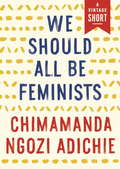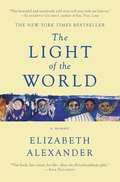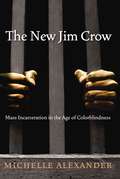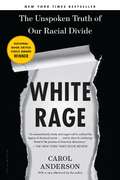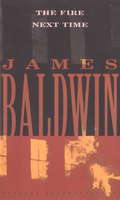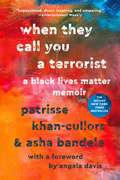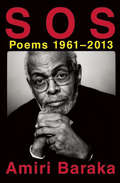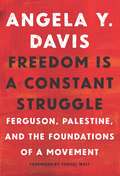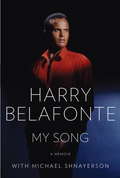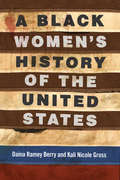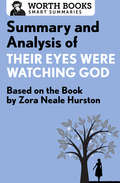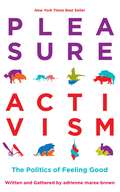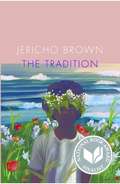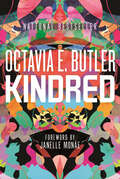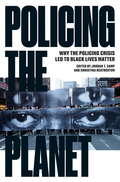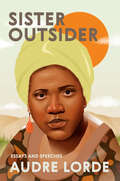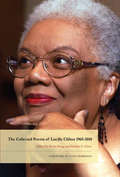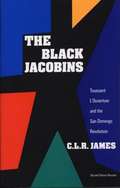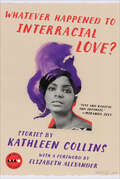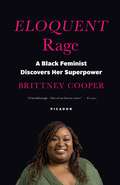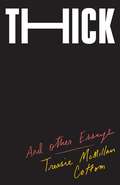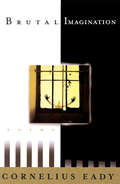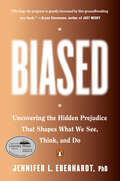Special Collections
Black Liberation Reading List
- Table View
- List View
We Should All Be Feminists
by Chimamanda Ngozi AdichieAn eBook short.What does "feminism" mean today? That is the question at the heart of We Should All Be Feminists, a personal, eloquently-argued essay--adapted from her much-viewed Tedx talk of the same name--by Chimamanda Ngozi Adichie, the award-winning author of Americanah and Half of a Yellow Sun. With humor and levity, here Adichie offers readers a unique definition of feminism for the twenty-first century--one rooted in inclusion and awareness. She shines a light not only on blatant discrimination, but also the more insidious, institutional behaviors that marginalize women around the world, in order to help readers of all walks of life better understand the often masked realities of sexual politics. Throughout, she draws extensively on her own experiences--in the U.S., in her native Nigeria, and abroad--offering an artfully nuanced explanation of why the gender divide is harmful for women and men, alike. Argued in the same observant, witty and clever prose that has made Adichie a bestselling novelist, here is one remarkable author's exploration of what it means to be a woman today--and an of-the-moment rallying cry for why we should all be feminists.
The Light of the World
by Elizabeth Alexander"PULITZER PRIZE IN LETTERS: BIOGRAPHY FINALIST"
"NATIONAL BOOK CRITICS CIRLE AWARDS AUTOBIOGRAPHY FINALIST"
New York Times Bestseller
First Lady Michelle Obama's Favorite Book of 2015
A New Yorker, NPR, Boston Globe, Publisher's Weekly, Newsday, Library Journal, People.com, Shelf Awareness, The Root, and St. Louis Dispact Best Book of 2015 Pick
New York Times Book Review Editor's Choice
An Amazon's Best Book of the Month, April 2015
IndieBound Indie Next #1 Pick, May 2015
A deeply resonant memoir for anyone who has loved and lost, from acclaimed poet and Pulitzer Prize finalist Elizabeth Alexander.
In THE LIGHT OF THE WORLD, Elizabeth Alexander finds herself at an existential crossroads after the sudden death of her husband. Channeling her poetic sensibilities into a rich, lucid price, Alexander tells a love story that is, itself, a story of loss. As she reflects on the beauty of her married life, the trauma resulting from her husband's death, and the solace found in caring for her two teenage sons, Alexander universalizes a very personal quest for meaning and acceptance in the wake of loss.
THE LIGHT OF THE WORLD is at once an endlessly compelling memoir and a deeply felt meditation on the blessings of love, family, art, and community. It is also a lyrical celebration of a life well-lived and a paean to the priceless gift of human companionship. For those who have loved and lost, or for anyone who cares what matters most, THE LIGHT OF THE WORLD is required reading.
The New Jim Crow
by Michelle AlexanderAs the United States celebrates the nation's "triumph over race" with the election of Barack Obama, the majority of young black men in major American cities are locked behind bars or have been labeled felons for life. Although Jim Crow laws have been wiped off the books, an astounding percentage of the African American community remains trapped in a subordinate status--much like their grandparents before them.In this incisive critique, former litigator-turned-legal-scholar Michelle Alexander provocatively argues that we have not ended racial caste in America: we have simply redesigned it. Alexander shows that, by targeting black men and decimating communities of color, the U.S. criminal justice system functions as a contemporary system of racial control, even as it formally adheres to the principle of color blindness. The New Jim Crow challenges the civil rights community--and all of us--to place mass incarceration at the forefront of a new movement for racial justice in America.
White Rage
by Carol AndersonFrom the end of the Civil War to our combustible present, an acclaimed historian reframes the conversation about race we must continue to have, chronicling the powerful forces that have long opposed black progress in America.
As Ferguson, Missouri, erupted in August 2014, with media commentators referring to the angry response of African Americans yet again as "black rage," historian Carol Anderson wrote a remarkable op-ed in the Washington Post showing that this was, instead, "white rage" at work. "With so much attention on the flames," she writes, "everyone had ignored the kindling."
Now, in her eloquent and powerfully argued narrative, Anderson makes clear that since 1865 and the passage of the Thirteenth Amendment, every time African Americans have made advances toward full participation in our democracy, white reaction--usually in the courts and legislatures--has fueled a deliberate and relentless rollback of their gains.
The end of the Civil War and Reconstruction was greeted with the Black Codes and Jim Crow.
The Great Migration north was physically opposed in many Southern states, and blacks often found conditions in the North to be no better. The Supreme Court's landmark 1954 Brown v. Board of Education decision was met with the shutting down of public schools throughout the South while taxpayer dollars financed segregated white private schools.
The Civil Rights Act of 1964 and Voting Rights Act of 1965 triggered a coded but powerful response--the so-called Southern Strategy and the War on Drugs that disenfranchised and imprisoned millions of African Americans.
The election of Barack Obama, and the promise it heralded of healing our racial divide, precipitated instead a rash of voter suppression laws in Southern and swing states, while the Supreme Court's decision in Shelby County v. Holder gutted a key provision of the Voting Rights Act.
Carefully linking these and other historical flash points when social progress for African Americans was countered by deliberate and cleverly crafted white opposition, Anderson pulls back the veil that has long covered punitive actions allegedly made in the name of protecting democracy, fiscal responsibility, or protection against fraud.
Compelling and dramatic in the unimpeachable history it relates over a century and a half, White Rage will add an important new dimension to the national conversation about race in America.
A New York Times Bestseller
White Rage
by Carol AndersonNational Book Critics Circle Award Winner New York Times Bestseller A New York Times Notable Book of the Year A Washington Post Notable Nonfiction Book of the Year A Boston Globe Best Book of 2016 A Chicago Review of Books Best Nonfiction Book of 2016 From the Civil War to our combustible present, acclaimed historian Carol Anderson reframes our continuing conversation about race, chronicling the powerful forces opposed to black progress in America. As Ferguson, Missouri, erupted in August 2014, and media commentators across the ideological spectrum referred to the angry response of African Americans as "black rage," historian Carol Anderson wrote a remarkable op-ed in The Washington Post suggesting that this was, instead, "white rage at work. With so much attention on the flames," she argued, "everyone had ignored the kindling. " Since 1865 and the passage of the Thirteenth Amendment, every time African Americans have made advances towards full participation in our democracy, white reaction has fueled a deliberate and relentless rollback of their gains. The end of the Civil War and Reconstruction was greeted with the Black Codes and Jim Crow; the Supreme Court's landmark 1954 Brown v. Board of Education decision was met with the shutting down of public schools throughout the South while taxpayer dollars financed segregated white private schools; the Civil Rights Act of 1964 and Voting Rights Act of 1965 triggered a coded but powerful response, the so-called Southern Strategy and the War on Drugs that disenfranchised millions of African Americans while propelling presidents Nixon and Reagan into the White House, and then the election of America's first black President, led to the expression of white rage that has been as relentless as it has been brutal. Carefully linking these and other historical flashpoints when social progress for African Americans was countered by deliberate and cleverly crafted opposition, Anderson pulls back the veil that has long covered actions made in the name of protecting democracy, fiscal responsibility, or protection against fraud, rendering visible the long lineage of white rage. Compelling and dramatic in the unimpeachable history it relates, White Rage will add an important new dimension to the national conversation about race in America.
The Fire Next Time
by James BaldwinNATIONAL BESTSELLER • The book that galvanized the nation, gave voice to the emerging civil rights movementin the 1960s—and still lights the way to understanding race in America today. • "The finest essay I&’ve ever read.&” —Ta-Nehisi CoatesAt once a powerful evocation of James Baldwin's early life in Harlem and a disturbing examination of the consequences of racial injustice, the book is an intensely personal and provocative document from the iconic author of If Beale Street Could Talk and Go Tell It on the Mountain. It consists of two "letters," written on the occasion of the centennial of the Emancipation Proclamation, that exhort Americans, both black and white, to attack the terrible legacy of racism. Described by The New York Times Book Review as "sermon, ultimatum, confession, deposition, testament, and chronicle … all presented in searing, brilliant prose," The Fire Next Time stands as a classic of literature.
When They Call You a Terrorist
by Asha Bandele and Angela Davis and Patrisse Khan-CullorsTHE INSTANT NEW YORK TIMES BESTSELLER.
Also: New York Times Editor’s Pick, O, Oprah’s Magazine’s “10 Titles to Pick Up Now,” Entertainment Weekly’s “13 Books to Read in January,” Cassius’ “Black Books to Add to Your Reading List,” Vogue’s “The Most Anticipated Books of January 2018,” Paste’s “10 of the Best Books of January 2018,” Bitch Magazine’s “Bitch Reads: 13 Books Feminists Should Read in January,” ELLE’s “19 of the Best Books to Read This Winter.”
"This remarkable book reveals what inspired Patrisse's visionary and courageous activism and forces us to face the consequence of the choices our nation made when we criminalized a generation. This book is a must-read for all of us." - Michelle Alexander, author of The New Jim Crow
A poetic and powerful memoir about what it means to be a Black woman in America―and the co-founding of a movement that demands justice for all in the land of the free.
Raised by a single mother in an impoverished neighborhood in Los Angeles, Patrisse Khan-Cullors experienced firsthand the prejudice and persecution Black Americans endure at the hands of law enforcement. For Patrisse, the most vulnerable people in the country are Black people. Deliberately and ruthlessly targeted by a criminal justice system serving a white privilege agenda, Black people are subjected to unjustifiable racial profiling and police brutality. In 2013, when Trayvon Martin’s killer went free, Patrisse’s outrage led her to co-found Black Lives Matter with Alicia Garza and Opal Tometi.
Condemned as terrorists and as a threat to America, these loving women founded a hashtag that birthed the movement to demand accountability from the authorities who continually turn a blind eye to the injustices inflicted upon people of Black and Brown skin.
Championing human rights in the face of violent racism, Patrisse is a survivor. She transformed her personal pain into political power, giving voice to a people suffering in equality and a movement fueled by her strength and love to tell the country―and the world―that Black Lives Matter.
When They Call You a Terrorist is Patrisse Khan-Cullors and asha bandele’s reflection on humanity. It is an empowering account of survival, strength and resilience and a call to action to change the culture that declares innocent Black life expendable.
Necessary and timely, Patrisse Cullors’ story asks us to remember that protest in the interest of the most vulnerable comes from love. Leaders of the Black Lives Matter movement have been called terrorists, a threat to America. But in truth, they are loving women whose life experiences have led them to seek justice for those victimized by the powerful. In this meaningful, empowering account of survival, strength, and resilience, Patrisse Cullors and asha bandele seek to change the culture that declares innocent black life expendable.
S O S
by Amiri BarakaA New York Times Editors' Choice Fusing the personal and the political in high-voltage verse, Amiri Baraka whose long illumination of the black experience in America was called incandescent in some quarters and incendiary in others (New York Times) was one of the preeminent literary innovators of the past century. Selected by Paul Vangelisti, this volume comprises the fullest spectrum of Baraka's rousing, revolutionary poems, from his first collection to previously unpublished pieces composed during his final years. Throughout Baraka’s career as a prolific writer (also published as LeRoi Jones), he was vehemently outspoken against oppression of African American citizens, and he radically altered the discourse surrounding racial inequality. The environments and social values that inspired his poetics changed during the course of his life, a trajectory that can be traced in this retrospective spanning more than five decades of profoundly evolving subjects and techniques. Praised for its lyricism and introspection, his early poetry emerged from the Beat generation, while his later writing is marked by intensely rebellious fervor and subversive ideology. All along, his primary focus was on how to live and love in the present moment despite the enduring difficulties of human history.
Freedom Is a Constant Struggle
by Angela Y. Davis and Frank BaratIn these newly collected essays, interviews, and speeches, world-renowned activist and scholar Angela Y. Davis illuminates the connections between struggles against state violence and oppression throughout history and around the world. Reflecting on the importance of black feminism, intersectionality, and prison abolitionism for today's struggles, Davis discusses the legacies of previous liberation struggles, from the Black Freedom Movement to the South African anti-Apartheid movement. She highlights connections and analyzes today's struggles against state terror, from Ferguson to Palestine. Facing a world of outrageous injustice, Davis challenges us to imagine and build the movement for human liberation. And in doing so, she reminds us that "Freedom is a constant struggle. "
My Song
by Harry Belafonte and Michael ShnayersonHarry Belafonte is not just one of the greatest entertainers of our time; he has led one of the great American lives of the last century. Now, this extraordinary icon tells us the story of that life, giving us its full breadth, letting us share in the struggles, the tragedies, and, most of all, the inspiring triumphs. Belafonte grew up, poverty-ridden, in Harlem and Jamaica. His mother was a complex woman--caring but withdrawn, eternally angry and rarely satisfied. His father was distant and physically abusive. It was not an easy life, but it instilled in young Harry the hard-nosed toughness of the city and the resilient spirit of the Caribbean lifestyle. It also gave him the drive to make good and channel his anger into actions that were positive and life-affirming. His journey led to the U.S. Navy during World War II, where he encountered an onslaught of racism but also fell in love with the woman he eventually married. After the war he moved back to Harlem, where he drifted between odd jobs until he saw his first stage play--and found the life he wanted to lead. Theater opened up a whole new world, one that was artistic and political and made him realize that not only did he have a need to express himself, he had a lot to express. He began as an actor--and has always thought of himself as such--but was quickly spotted in a musical, began a tentative nightclub career, and soon was on a meteoric rise to become one of the world's most popular singers. Belafonte was never content to simply be an entertainer, however. Even at enormous personal cost, he could not shy away from activism. At first it was a question of personal dignity: breaking down racial barriers that had never been broken before, achieving an enduring popularity with both white and black audiences. Then his activism broadened to a lifelong, passionate involvement at the heart of the civil rights movement and countless other political and social causes. The sections on the rise of the civil rights movement are perhaps the most moving in the book: his close friendship with Martin Luther King, Jr.; his role as a conduit between Dr. King and the Kennedys; his up-close involvement with the demonstrations and awareness of the hatred and potential violence around him; his devastation at Dr. King's death and his continuing fight for what he believes is right. But My Song is far more than the history of a movement. It is a very personal look at the people in that movement and the world in which Belafonte has long moved. He has befriended many beloved and important figures in both entertainment and politics--Paul Robeson, Eleanor Roosevelt, Sidney Poitier, John F. Kennedy, Marlon Brando, Robert Kennedy, Nelson Mandela, Fidel Castro, Tony Bennett, Bill Clinton--and writes about them with the same exceptional candor with which he reveals himself on every page. This is a book that pulls no punches, and turns both a loving and critical eye on our country's cultural past. As both an artist and an activist, Belafonte has touched countless lives. With My Song, he has found yet another way to entertain and inspire us. It is an electrifying memoir from a remarkable man.From the Hardcover edition.
My Song
by Harry Belafonte and Michael ShnayersonHarry Belafonte is not just one of the greatest entertainers of our time; he has led one of the great American lives of the last century. Now, this extraordinary icon tells us the story of that life, giving us its full breadth, letting us share in the struggles, the tragedies, and, most of all, the inspiring triumphs. Belafonte grew up, poverty-ridden, in Harlem and Jamaica. His mother was a complex woman--caring but withdrawn, eternally angry and rarely satisfied. His father was distant and physically abusive. It was not an easy life, but it instilled in young Harry the hard-nosed toughness of the city and the resilient spirit of the Caribbean lifestyle. It also gave him the drive to make good and channel his anger into actions that were positive and life-affirming. His journey led to the U.S. Navy during World War II, where he encountered an onslaught of racism but also fell in love with the woman he eventually married. After the war he moved back to Harlem, where he drifted between odd jobs until he saw his first stage play--and found the life he wanted to lead. Theater opened up a whole new world, one that was artistic and political and made him realize that not only did he have a need to express himself, he had a lot to express. He began as an actor--and has always thought of himself as such--but was quickly spotted in a musical, began a tentative nightclub career, and soon was on a meteoric rise to become one of the world's most popular singers. Belafonte was never content to simply be an entertainer, however. Even at enormous personal cost, he could not shy away from activism. At first it was a question of personal dignity: breaking down racial barriers that had never been broken before, achieving an enduring popularity with both white and black audiences. Then his activism broadened to a lifelong, passionate involvement at the heart of the civil rights movement and countless other political and social causes. The sections on the rise of the civil rights movement are perhaps the most moving in the book: his close friendship with Martin Luther King, Jr.; his role as a conduit between Dr. King and the Kennedys; his up-close involvement with the demonstrations and awareness of the hatred and potential violence around him; his devastation at Dr. King's death and his continuing fight for what he believes is right. But My Song is far more than the history of a movement. It is a very personal look at the people in that movement and the world in which Belafonte has long moved. He has befriended many beloved and important figures in both entertainment and politics--Paul Robeson, Eleanor Roosevelt, Sidney Poitier, John F. Kennedy, Marlon Brando, Robert Kennedy, Nelson Mandela, Fidel Castro, Tony Bennett, Bill Clinton--and writes about them with the same exceptional candor with which he reveals himself on every page. This is a book that pulls no punches, and turns both a loving and critical eye on our country's cultural past. As both an artist and an activist, Belafonte has touched countless lives. With My Song, he has found yet another way to entertain and inspire us. It is an electrifying memoir from a remarkable man.From the Hardcover edition.
A Black Women's History of the United States
by Daina Ramey Berry and Kali Nicole GrossA vibrant and empowering history that emphasizes the perspectives and stories of African American women to show how they are--and have always been--instrumental in shaping our country
In centering Black women's stories, two award-winning historians seek both to empower African American women and to show their allies that Black women's unique ability to make their own communities while combatting centuries of oppression is an essential component in our continued resistance to systemic racism and sexism. Daina Ramey Berry and Kali Nicole Gross offer an examination and celebration of Black womanhood, beginning with the first African women who arrived in what became the United States to African American women of today.
A Black Women's History of the United States reaches far beyond a single narrative to showcase Black women's lives in all their fraught complexities. Berry and Gross prioritize many voices: enslaved women, freedwomen, religious leaders, artists, queer women, activists, and women who lived outside the law. The result is a starting point for exploring Black women's history and a testament to the beauty, richness, rhythm, tragedy, heartbreak, rage, and enduring love that abounds in the spirit of Black women in communities throughout the nation.
Summary and Analysis of Their Eyes Were Watching God
by Worth BooksSo much to read, so little time? This brief overview of Their Eyes Were Watching God tells you what you need to know—before or after you read Zora Neale Hurston’s book. Crafted and edited with care, Worth Books set the standard for quality and give you the tools you need to be a well-informed reader. This short summary and analysis of Their Eyes Were Watching God includes: Historical contextCast of charactersChapter-by-chapter overviewsCharacter analysisThemes and symbolsImportant quotesFascinating triviaGlossary of termsSupporting material to enhance your understanding of the original work About Their Eyes Were Watching God by Zora Neale Hurston: Their Eyes Were Watching God is storytelling at its soulful and powerful best. Published nearly a century ago, this classic novel remains unequivocally woven into the fabric of our country’s rich African American heritage, culture, and history. A passionate tribute to the strength and perseverance of the human heart, Zora Neale Hurston’s tale of one woman’s journey to self-actualization and unconditional love at the dawn of the twentieth century is filled with melodic voices and memorable characters, and resonates with symbolism in every chapter. The summary and analysis in this ebook are intended to complement your reading experience and bring you closer to a great work of fiction.
Pleasure Activism
by Leah Lakshmi Piepzna-Samarasinha and Adrienne Maree Brown and Favianna RodriguezHow do we make social justice the most pleasurable human experience? How can we awaken within ourselves desires that make it impossible to settle for anything less than a fulfilling life? Author and editor adrienne maree brown finds the answer in something she calls "pleasure activism," a politics of healing and happiness that explodes the dour myth that changing the world is just another form of work. Drawing on the black feminist tradition, she challenges us to rethink the ground rules of activism. Her mindset-altering essays are interwoven with conversations and insights from other feminist thinkers, including Audre Lorde, Joan Morgan, Cara Page, Sonya Renee Taylor, and Alexis Pauline Gumbs. Together they cover a wide array of subjects--from sex work to climate change, from race and gender to sex and drugs--building new narratives about how politics can feel good and how what feels good always has a complex politics of its own.
The Tradition
by Jericho BrownThe Tradition details the normalization of evil and its history at the intersection of the past and the personal. Brown’s poetic concerns are both broad and intimate, and at their very core a distillation of the incredibly human: What is safety? Who is this nation? Where does freedom truly lie? Brown makes mythical pastorals to question the terrors to which we’ve become accustomed, and to celebrate how we survive.
Kindred
by Octavia E. ButlerSelected by The Atlantic as one of THE GREAT AMERICAN NOVELS. ("You have to read them.")From the New York Times bestselling author of Parable of the Sower and MacArthur &“Genius&” Grant, Nebula, and Hugo award winner The visionary time-travel classic whose Black female hero is pulled through time to face the horrors of American slavery and explores the impacts of racism, sexism, and white supremacy then and now. &“I lost an arm on my last trip home. My left arm.&”Dana&’s torment begins when she suddenly vanishes on her 26th birthday from California, 1976, and is dragged through time to antebellum Maryland to rescue a boy named Rufus, heir to a slaveowner&’s plantation. She soon realizes the purpose of her summons to the past: protect Rufus to ensure his assault of her Black ancestor so that she may one day be born. As she endures the traumas of slavery and the soul-crushing normalization of savagery, Dana fights to keep her autonomy and return to the present.Blazing the trail for neo-slavery narratives like Colson Whitehead&’s The Underground Railroad and Ta-Nehisi Coates&’s The Water Dancer, Butler takes one of speculative fiction&’s oldest tropes and infuses it with lasting depth and power. Dana not only experiences the cruelties of slavery on her skin but also grimly learns to accept it as a condition of her own existence in the present. &“Where stories about American slavery are often gratuitous, reducing its horror to explicit violence and brutality, Kindred is controlled and precise&” (New York Times).&“Reading Octavia Butler taught me to dream big, and I think it&’s absolutely necessary that everybody have that freedom and that willingness to dream.&” —N. K. Jemisin This book has been published with two different covers. Customers will be shipped the cover available.
Policing the Planet
by Jordan T. Camp and Christina HeathertonHow policing became the major political issue of our timeCombining firsthand accounts from activists with the research of scholars and reflections from artists, Policing the Planet traces the global spread of the broken-windows policing strategy, first established in New York City under Police Commissioner William Bratton. It's a doctrine that has vastly broadened police power the world over--to deadly effect.With contributions from #BlackLivesMatter cofounder Patrisse Cullors, Ferguson activist and Law Professor Justin Hansford, Director of New York-based Communities United for Police Reform Joo-Hyun Kang, poet Martín Espada, and journalist Anjali Kamat, as well as articles from leading scholars Ruth Wilson Gilmore, Robin D. G. Kelley, Naomi Murakawa, Vijay Prashad, and more, Policing the Planet describes ongoing struggles from New York to Baltimore to Los Angeles, London, San Juan, San Salvador, and beyond.From the Trade Paperback edition.
Sister Outsider
by Audre Lorde and Cheryl ClarkePresenting the essential writings of black lesbian poet and feminist writer Audre Lorde, SISTER OUTSIDER celebrates an influential voice in twentieth-century literature. In this charged collection of fifteen essays and speeches, Lorde takes on sexism, racism, ageism, homophobia, and class, and propounds social difference as a vehicle for action and change. Her prose is incisive, unflinching, and lyrical, reflecting struggle but ultimately offering messages of hope. This commemorative edition includes a new foreword by Lorde scholar and poet Cheryl Clarke, who celebrates the ways in which Lorde's philosophies resonate more than twenty years after they were first published. These landmark writings are, in Lorde's own words, a call to "never close our eyes to the terror, to the chaos which is Black which is creative which is female which is dark which is rejected which is messy which is. ..."
Reviews: "...it's been almost a quarter of a century since Audre Lorde's essays and speeches in Sister Outsider made an indelible mark on 20th-century literature. But the words of the black lesbian feminist poet seem as lyrical and unforgettable, and, sadly, as relevant today as when she first tackled everything from racism and homophobia to ageism and class dichotomies. A must-have book that every lesbian should read."--Curve Editor's Pick. "Lorde was a brilliant feminist poet and intellectual whose theories on the power of embracing our internal contradictions as well as the differences between people and groups is the way to powerful coalition building and social progress." --New York Post, Sunday. "Poet and librarian Lorde collected 15 of her finest essays and speeches in this 1984 volume. With her poet's command of language, she addresses sexism, racism, black women, black lesbians, eroticism, and more. Still powerful."--Library Journal, Starred Review. "Audre Lorde is a passionate sage. I say 'is' and not 'was' because her keen insights continue to provoke and sustain us and give us courage. The reissue of this book is a gift to longtime admirers and to new readers who have yet to discover the power and grace and splendid audacity of Audre Lorde."--Valerie Miner, author of After Eden and professor of feminist studies at Stanford University. "[Lorde's] works will be important to those truly interested in growing up sensitive, intelligent, and aware."--New York Times.
The Collected Poems of Lucille Clifton 1965-2010
by Lucille CliftonWinner of the 2013 Hurston/Wright Legacy Award for Poetry"The Collected Poems of Lucille Clifton 1965-2010 may be the most important book of poetry to appear in years."--Publishers Weekly"All poetry readers will want to own this book; almost everything is in it."--Publishers Weekly"If you only read one poetry book in 2012, The Collected Poems of Lucille Clifton ought to be it."-NPR"The 'Collected Clifton' is a gift, not just for her fans...but for all of us."--The Washington Post"The love readers feel for Lucille Clifton-both the woman and her poetry-is constant and deeply felt. The lines that surface most frequently in praise of her work and her person are moving declarations of racial pride, courage, steadfastness."-Toni Morrison, from the ForewordThe Collected Poems of Lucille Clifton 1965-2010 combines all eleven of Lucille Clifton's published collections with more than fifty previously unpublished poems. The unpublished poems feature early poems from 1965-1969, a collection-in-progress titled the book of days (2008), and a poignant selection of final poems. An insightful foreword by Nobel Prize-winning author Toni Morrison and comprehensive afterword by noted poet Kevin Young frames Clifton's lifetime body of work, providing the definitive statement about this major America poet's career.On February 13, 2010, the poetry world lost one of its most distinguished members with the passing of Lucille Clifton. In the last year of her life, she was named the first African American woman to receive the $100,000 Ruth Lilly Poetry Prize honoring a US poet whose "lifetime accomplishments warrant extraordinary recognition," and was posthumously awarded the Robert Frost Medal for lifetime achievement from the Poetry Society of America."mother-tongue: to man-kind" (from the unpublished the book of days):all that I am asking isthat you see me as somethingmore than a common occurrence,more than a woman in her ordinary skin.
The Black Jacobins
by C.L.R. JamesIt is the story of the French colony of San Domingo, a place where the brutality of master toward slave was commonplace and ingeniously refined. And it is the story of a barely literate slave named Toussaint L'Ouverture, who led the black people of San Domingo in a successful struggle against successive invasions by overwhelming French, Spanish, and English forces.
Whatever Happened to Interracial Love?
by Kathleen CollinsA collection of newly discovered and never-before-published stories by the late Kathleen Collins, a brilliant yet little-known African American writer, artist, and filmmaker.Exuberant, poignant, perceptive, and full of grace, these sixteen stories by Kathleen Collins explore deep, far-reaching issues—relating to race, gender, family, and sexuality—that shape the ordinary moments in our lives. Collins’s work masterfully blends the quotidian and the profound in a personal, intimate way, seamlessly integrating the African American experience into her characters’ lives and creating rich and devastatingly familiar characters who transcend symbolism.In “The Uncle,” a young girl who idolizes her handsome uncle and his beautiful wife makes a haunting discovery about their lives. In “Only Once,” a woman reminisces about her charming daredevil of a lover and his ultimate—and final—act of foolishness. And in the title story, a recent college graduate realizes the limits of the civil rights movement—and the personal and romantic consequences it holds for her. Both contemporary and timeless, Whatever Happened to Interracial Love? is a major and long- overdue addition to our literary canon.
Eloquent Rage
by Brittney CooperSo what if it’s true that Black women are mad as hell? They have the right to be. In the Black feminist tradition of Audre Lorde, Brittney Cooper reminds us that anger is a powerful source of energy that can give us the strength to keep on fighting.
Far too often, Black women’s anger has been caricatured into an ugly and destructive force that threatens the civility and social fabric of American democracy. But Cooper shows us that there is more to the story than that. Black women’s eloquent rage is what makes Serena Williams such a powerful tennis player. It’s what makes Beyoncé’s girl power anthems resonate so hard. It’s what makes Michelle Obama an icon. Eloquent rage keeps us all honest and accountable. It reminds women that they don’t have to settle for less.
When Cooper learned of her grandmother's eloquent rage about love, sex, and marriage in an epic and hilarious front-porch confrontation, her life was changed. And it took another intervention, this time staged by one of her homegirls, to turn Brittney into the fierce feminist she is today. In Brittney Cooper’s world, neither mean girls nor fuckboys ever win. But homegirls emerge as heroes. This book argues that ultimately feminism, friendship, and faith in one's own superpowers are all we really need to turn things right side up again.
Thick
by Tressie McMillan CottomIn eight highly praised treatises on beauty, media, money, and more, Tressie McMillan Cottom—award-winning professor and acclaimed author of Lower Ed—is unapologetically “thick”: deemed “thick where I should have been thin, more where I should have been less,” McMillan Cottom refuses to shy away from blending the personal with the political, from bringing her full self and voice to the fore of her analytical work. Thick “transforms narrative moments into analyses of whiteness, black misogyny, and status-signaling as means of survival for black women” (Los Angeles Review of Books) with “writing that is as deft as it is amusing” (Darnell L. Moore).
This “transgressive, provocative, and brilliant” (Roxane Gay) collection cements McMillan Cottom’s position as a public thinker capable of shedding new light on what the “personal essay” can do. She turns her chosen form into a showcase for her critical dexterity, investigating everything from Saturday Night Live, LinkedIn, and BBQ Becky to sexual violence, infant mortality, and Trump rallies.
Collected in an indispensable volume that speaks to the everywoman and the erudite alike, these unforgettable essays never fail to be “painfully honest and gloriously affirming” and hold “a mirror to your soul and to that of America” (Dorothy Roberts).
Brutal Imagination PA
by Cornelius EadyBrutal Imagination is the work of a poet at the peak of his considerable powers. Its two central sections--which could be called song cycles--confront the same subject: the black man in America. The first, which carries the book's title, deals with the vision of the black man in white imagination. Narrated largely by the black kidnapper that Susan Smith invented to cover up the killing of her two sons, the cycle displays all of Mr. Eady's range: his deft wit, inventiveness, and skillfully targeted anger, and the way in which he combines the subtle with the charged, street idiom with elegant inversions, harsh images with the sweetly ordinary. The second cycle, Running Man, presents poems Mr. Eady drew on for his libretto for the music-drama of the same name, which was a l999 Pulitzer Prize finalist. Here, the focus is the black family and the barriers of color, class, and caste that tear it apart. As the Village Voice said, It is a hymn to all the sons this country has stolen from her African- American families.
Biased
by Jennifer L. Eberhardt"Groundbreaking."--Bryan Stevenson, New York Times bestselling author of Just MercyFrom one of the world's leading experts on unconscious racial bias, a personal examination of one of the central controversies and culturally powerful issues of our time, and its influence on contemporary race relations and criminal justice.You don't have to be racist to be biased. Unconscious bias can be at work without our realizing it, and even when we genuinely wish to treat all people equally, ingrained stereotypes can infect our visual perception, attention, memory, and behavior. This has an impact on education, employment, housing, and criminal justice. In Biased, with a perspective that is at once scientific, investigative, and informed by personal experience, Jennifer Eberhardt offers us insights into the dilemma and a path forward.Eberhardt works extensively as a consultant to law enforcement and as a psychologist at the forefront of this new field. Her research takes place in courtrooms and boardrooms, in prisons, on the street, and in classrooms and coffee shops. She shows us the subtle--and sometimes dramatic--daily repercussions of implicit bias in how teachers grade students, or managers deal with customers. It has an enormous impact on the conduct of criminal justice, from the rapid decisions police officers have to make to sentencing practices in court. Eberhardt's work and her book are both influenced by her own life, and the personal stories she shares emphasize the need for change. She has helped companies that include Airbnb and Nextdoor address bias in their business practices and has led anti-bias initiatives for police departments across the country. Here, she offers practical suggestions for reform and new practices that are useful for organizations as well as individuals. Unblinking about the tragic consequences of prejudice, Eberhardt addresses how racial bias is not the fault of nor restricted to a few "bad apples" but is present at all levels of society in media, education, and business. The good news is that we are not hopelessly doomed by our innate prejudices. In Biased, Eberhardt reminds us that racial bias is a human problem--one all people can play a role in solving.
